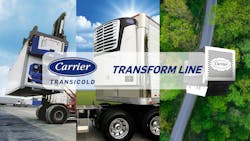Carrier introduces aftermarket reefer solutions
Carrier Refrigeration recently launched Transform Line, a range of modernization and retrofit solutions for truck, trailer, rail, and container refrigeration systems worldwide.
Transform Line will help transport refrigeration customers meet future demands with their existing fleets and improve return on their investments, the company reported.
“Transform Line is an exciting addition to our portfolio of aftermarket solutions that will give our customers the ability to modernize and upgrade their existing fleets, and address future demands of electrification, energy efficiency, sustainability, and digital connectivity,” Bhasker Kaushal, vice president and general manager for Sensitech and Carrier Refrigeration aftermarket, said in a news release. “Transform Line solutions come with next-generation technology that extends equipment lifespan and delivers superior performance into the future.
“Whether the demands are for better fuel economy, enhanced cargo quality, or compliance with new regulations, we offer solutions to enhance our customers’ fleets across the lifecycle.”
This innovative product line is designed to modernize customers’ fleets, transform performance, support regulatory compliance to reduce environmental impact, and enhance cargo quality.
Transforming performance and reducing environmental impact
Carrier Transicold in Europe offers the Eco-Drive power module, an aftermarket product now available through Transform Line. The retrofit solution for trucks and trailers uses a hydraulic pump connected to the truck engine’s power take-off. This drives a generator that delivers the electrical power required for the refrigeration unit, providing 100% refrigeration capacity independently of the truck engine’s speed, even when idling. The Eco-Drive range provides flexibility, as it can be used for various applications and meet the needs of customers operating mixed fleets.
Supporting regulatory compliance
To meet California Air Resources Board (CARB) regulations, Carrier Transicold offers engine emissions systems (EES) retrofit kits for generator sets, and trailer refrigeration units built prior to mid-2023 through Transform Line. These kits ensure compliance with stringent emissions standards, helping customers operating gensets and transport refrigeration units in California maintain regulatory compliance.
Enhancing cargo quality
Carrier Transicold now offers EverFRESH controlled-atmosphere retrofit kits for container refrigeration units. These kits, available through Transform Line, are designed to improve the quality and longevity of transported goods, ensuring they arrive in optimal condition.
Carrier Refrigeration plans to launch additional Transform Line offerings in 2025. Offerings will include transport refrigeration unit upgrades, as well as solutions to optimize fleet sustainability and cargo quality.
